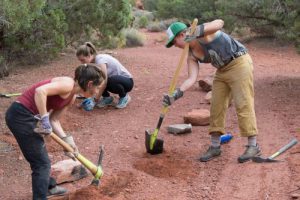Outdoor Recreation, Stoke, and the Power of Place
 In Your Stoke Won’t Save Us, published in the March issue of the High Country News, Ethan Linck elegantly distills hundreds of thousands of Instagrams of adventurous people in dramatic landscapes into a single phrase: “Stoke has become an ethos.” Critical of this trend, he goes on to elucidate his claim: “For those of us who identify with modern outdoor recreation culture, stoke has increasingly begun to mediate our relationship with the natural world. [In the past], I have implicitly linked my passion for skiing, climbing, and running with a passion for conservation and environmental stewardship. But after accepting this premise for most of a decade, I am no longer so sure.”
In Your Stoke Won’t Save Us, published in the March issue of the High Country News, Ethan Linck elegantly distills hundreds of thousands of Instagrams of adventurous people in dramatic landscapes into a single phrase: “Stoke has become an ethos.” Critical of this trend, he goes on to elucidate his claim: “For those of us who identify with modern outdoor recreation culture, stoke has increasingly begun to mediate our relationship with the natural world. [In the past], I have implicitly linked my passion for skiing, climbing, and running with a passion for conservation and environmental stewardship. But after accepting this premise for most of a decade, I am no longer so sure.”
As both an educator and researcher (having written my doctoral dissertation focused on the connection between outdoor recreation and environmental values), I couldn’t help but find Linck’s claim both provocative, compelling, and timely. His criticism of the assumption that outdoor recreationists are inherently conservationists is sharp, if not least for cutting close to home: he even cites an Ed Abbey quote that is a staple evening reading on HMI wilderness expeditions.
It seems intuitive that by recreating outdoors, people come to deeply appreciate and understand it, and somehow want to protect it. We even see the outdoor recreation community rallying around a fight for public lands since the recent Bears Ears controversy. But Linck highlights that our motivations may be misaligned with the principles of conservation biology:
“Should we fight for public lands because they provide us with recreation opportunities, or because they support biodiversity? . . . The field of conservation biology tells us that long-term ecological stability requires the latter. But stoke fundamentally centers on the self and the quality of human experience, and thus has no intrinsic stake in biodiversity or ecosystem stability.”
Don’t tell your #stoked friends that I said this, but Linck is, academically speaking, right on. No, loving to ski or run in places that feel natural doesn’t inherently make us more likely to act in ways that promote ecological integrity. What our love for the outdoors can do, however, is help us develop both a stronger connection to nature and place (what Linck sites as place attachment). As this connection strengthens, we tend to stop thinking of ourselves as visitors—tourists if you will —and start seeing ourselves as inhabitants whose own ability to thrive is intertwined with the health of our surrounding environment. In my own research, I found an individual’s self-serving interest to preserve recreation access may compel them to volunteer with an outdoor recreation organization. Among a host of positive outcomes from volunteering was the development of a deeper understanding and appreciation of nature and place, which ultimately led to stronger environmental values.
As an educator, I’m particularly interested in what this place attachment offers students in terms of learning opportunities. The forces that shape our attitudes about recreation, land use, and broader environmental ethics are the same that shape the jobs we hold, votes we cast, places we live, and communities we participate in. By understanding these forces, and the impacts our actions and values have on places, our students gain a broader perspective on these issues while reflecting on their role as a citizen to address them.
This, then, is the power of stoke. It motivates us to pursue an experience that bonds us to a place. Once we move beyond mere consumer to inhabitant, the intricacies and complexities of that place emerge, as does our desire to engage with it start to transcend the self-serving.
 At HMI, we use outdoor adventure as the backdrop to teach about traditional academic subjects, issues of identity and privilege, leadership and community, and current political affairs (such as the Bears Ears Monument controversy). In addition, students learn what it means to become part of a community of place, with shared responsibility for its stewardship. From participating in daily chores and cook crew to volunteering high up on a 14,000 ft. mountain to restore a trail, students learn that life is more than pure stoke – which Linck defines as “unbridled enthusiasm and the uncomplicated pursuit of experience”—to a richer pursuit of joy and purpose that is much harder to distill into one Instragram post.
At HMI, we use outdoor adventure as the backdrop to teach about traditional academic subjects, issues of identity and privilege, leadership and community, and current political affairs (such as the Bears Ears Monument controversy). In addition, students learn what it means to become part of a community of place, with shared responsibility for its stewardship. From participating in daily chores and cook crew to volunteering high up on a 14,000 ft. mountain to restore a trail, students learn that life is more than pure stoke – which Linck defines as “unbridled enthusiasm and the uncomplicated pursuit of experience”—to a richer pursuit of joy and purpose that is much harder to distill into one Instragram post.


 Semester 40: “Enjoying Leadville’s beauty”
Semester 40: “Enjoying Leadville’s beauty”